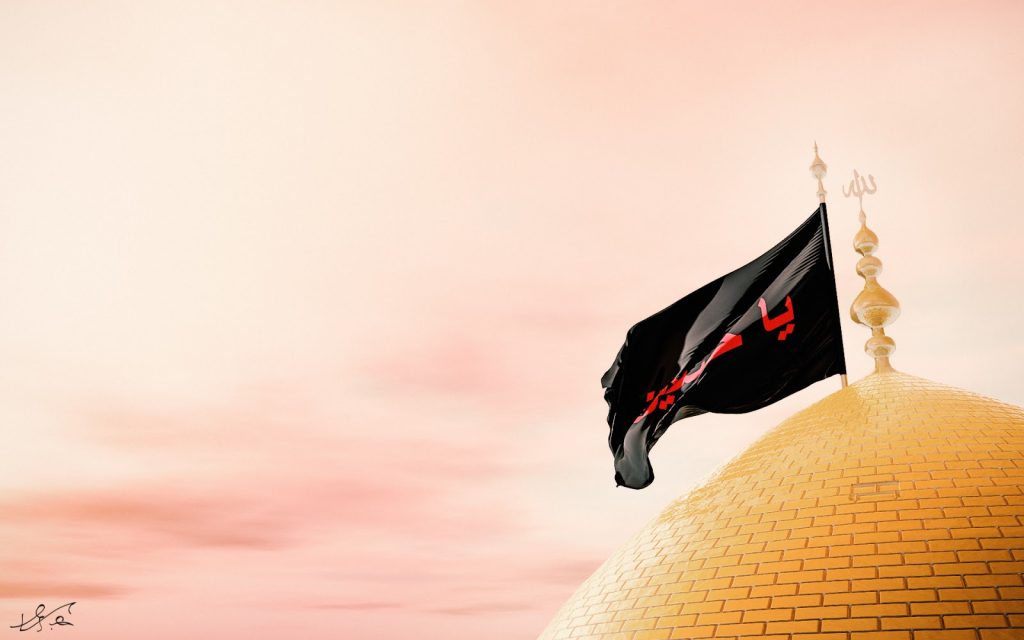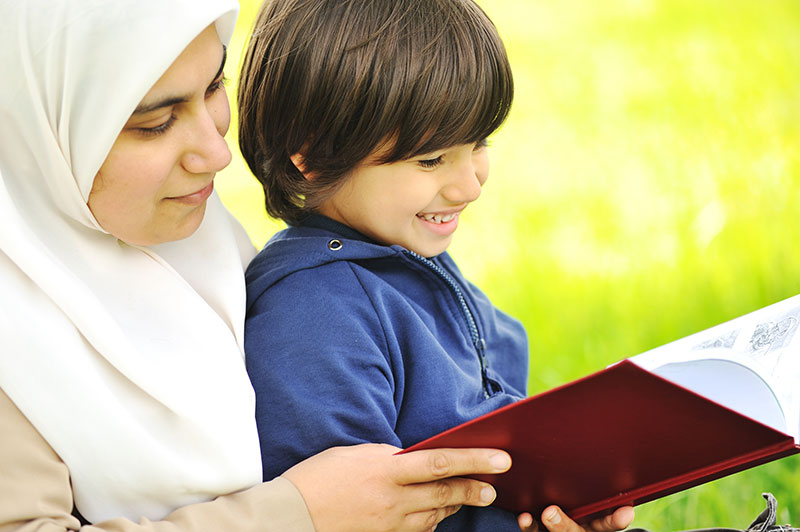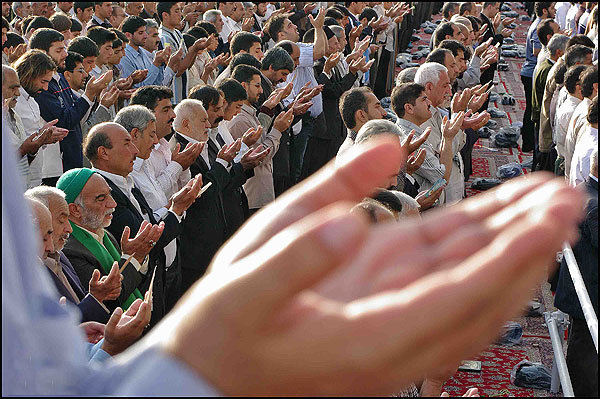The Christian who was martyred for Imam Hussain in Karbala
You can Also visit our Chanel in YouTube and watch this video
You can Also visit our Chanel in YouTube and watch this video
 As the month of Muharram approaches, the first month on the Islamic calendar, the official website of Ayatollah Khamenei publishes statements on the importance of Muharram, by relying on Quran he argues why Muslims mourn for the martyrdom of Imam Hussein (Peace Be Upon Him). Now I would like to discuss a point regarding the efforts to promote Islam in the month of Muharram. Some people may question the value of the ceremonies for mourning Imam Hussein’s (a.s.) martyrdom.
As the month of Muharram approaches, the first month on the Islamic calendar, the official website of Ayatollah Khamenei publishes statements on the importance of Muharram, by relying on Quran he argues why Muslims mourn for the martyrdom of Imam Hussein (Peace Be Upon Him). Now I would like to discuss a point regarding the efforts to promote Islam in the month of Muharram. Some people may question the value of the ceremonies for mourning Imam Hussein’s (a.s.) martyrdom.
They may say, “If you want to speak about Imam Hussein’s (a.s.) movement, just go ahead and speak about his movement. Why all the crying?” This is a wrong assumption. It will be extremely hard to move ahead on this path in the absence of this emotional connection to the infallible Imams. This is why Imam Khomeini (r.a.) recommended the traditional forms of mourning. The Quranic verses about the role of the infallible Imams are interpreted in three different ways. Wilayat [Guardianship] is one of these interpretations. “Your guardian can only be Allah – and His messenger and those who believe, who establish worship and pay charity, and bow down (in prayer).
” [The Holy Quran, 5: 55] Another interpretation is submission and obedience. “Obey Allah and obey the Messenger and those in authority from among you.” [The Holy Quran, 4: 59] Friendship is the third interpretation. “Say: I do not ask of you any reward for it but love for my near relatives.” [The Holy Quran, 42: 23] What is this friendship? People are advised to accept their Wilayat and obey them, but what is friendship for? This friendship is a kind of assurance. After the Holy Prophet (s.w.a.) passed away, those who ended this friendship gradually brushed aside the leadership of the infallible Imams (a.s.).
In the absence of this sense of friendship, the Islamic Ummah will face the same disasters. Therefore, this sense of friendship is of paramount importance, and it can be achieved through this emotional connection to the infallible Imams (a.s.). Narrating the tragedies that happened to them is an attempt to establish this emotional connection. Similarly, praising their virtues [through the mourning ceremonies] is another way to form this emotional bond.
Therefore, it is necessary to hold the mourning ceremonies and narrate the events of Ashura. Some people should not adopt a so-called intellectual position and reject the necessity of these mourning ceremonies. These ceremonies are necessary, and they will always be necessary.
Of course some forms of mourning are unacceptable. For instance, “Qame Zani” [a religiously prohibited ritual in which people cut their foreheads] has been declared haraam, and it must not be practiced. That is because Qame Zani will make the enemies more insolent and will give them an advantage over those who love the members of the Holy Prophet’s household. But the common mourning rituals can increasingly strengthen one’s emotional connection to the infallible Imams. These rituals are very good.
Ayatollah Khamenei
 Among the important questions concerning the issue of Mahdawiyyat is Imam Mahdi’s long life. Some Sunni scholars like Sa’ad al-Din Taftazani are of the view that Mahdi cannot live such a long life saying that it cannot be easily accepted that someone may live such a long life in this world.
Among the important questions concerning the issue of Mahdawiyyat is Imam Mahdi’s long life. Some Sunni scholars like Sa’ad al-Din Taftazani are of the view that Mahdi cannot live such a long life saying that it cannot be easily accepted that someone may live such a long life in this world.
Taftazani does not deny that Mahdi, son of Imam Hasan Askari is born. What he terms as unacceptable is his extraordinary long life.
It is on the basis of such an opinion that some Sunni scholars based on existing evidence accept that Imam Mahdi is born but claim that now he is no longer alive. This is because they regard it as unlikely for a person to live an extraordinary long life. Their opinion is however in contradiction with a prophetic tradition saying:
من مات و لم یعرف امام زمانه مات میته جاهلیه
He who dies without knowing the imam of his time, dies the death of ignorance.
According to this tradition, there is no time without an imam. Given such traditions, some Sunni scholars, have, instead of speaking about the death of Imam Mahdi, said that they know that he is born but they do not know what has happened to him. Since they cannot accept Imam Mahdi’s long life, therefore they are not willing to confess to it.
On the hand, since they know that the rejection of Imam Mahdi’s long life is in contradiction with traditions, they do not explicitly reject his long life. As a result, they accept his birth, though they say they do not know what has happened to him.
It seems as if they feel compelled to accept these traditions and thus they are required to accept his birth and long life as well.
Something might seem incredible before it happens, but once it happens it is no longer incredible. For example, you believe that something is impossible, but if it happens for once you can no longer be cocksure about its impossibility and your certainty will decrease. Now if the same phenomenon happens for twice and thrice, your certainty will also decrease correspondingly. If this process continues to happen your certainty will continue to decrease.
Now in response to what Taftazani has said, it must be pointed out that Allah has given long lives to (many including) Noah, Khidr and Jesus Christ. The belief in Jesus’s long life is an essential belief among Muslims and no one can deny that Jesus is alive now.
Similarly based on Sunni traditions, Dajjal is alive now and they believe firmly that he is alive now.
Now that there have been many people in the world, who have lived long lives, no one can deny as improbable Imam Mahdi’s long life.
The discoveries and inventions we observe everyday also make impossibles possible.
The belief cherished by Taftazani and his likes that long life is improbable gets increasingly weakened as history proceeds ahead.
[To explain it further], some of our scholars have said that it may look queer if someone claims that he is able to walk on the surface of water, but if he does it for once and people watch it, they will somewhat change their views concerning walking on water’s surface. If he does it for many times, it will become a natural act and everyone will easily accept it.
He basically refuses to accept that Khidr is alive now saying that most scholars are of the view that he is dead by now.1
He rejects the fact the Khidr is alive by now in order to be able to say that the point that Mahdi is alive by now is very unlikely.
Contrary to Ibn Taymiyya, in his al-Isaba, Ibn Hajar Asqalani considers Khidr as one of the companions of the Holy Prophet(S).3
Likewise, in his Tahdib al-Asma wa al-Lughat, Hafiz Nawavi, a sixth or seventh century scholar openly says that according to most scholars Khidr is alive now.2
This shows that Khidr was alive when Nawavi was living.
Other scholars like Qari (in his Mirqat al-Mafatih fi Sharh Mishkat al-Masabih (4) and the commentator of al-Mawahib al-Ladunniya who lived years after Nawavi’s time, were also of the view that Mahdi was alive (at least) until their times. They have gone so far that they have mentioned in their books stories of people meeting Khidr and listening to his words.
Given all these issues, Ibn Taymiyya’s refusal to accept that Khidr is alive is very meaningful! He knew if he accepted that Khidr was alive it would pave the ground for rejecting the theory that rejects Mahdi’s long life as incredible.
Moreover, if Allah who is all-power, wills on certain grounds to keep someone alive for thousands of years He will do it. Thus it is not that much difficult to answer the question of Imam’s long life in our present time.
 According to Islamic teachings, the position of the mother is so high. We see that we are ordered by the Quran and the Narrations of the Infallibles to respect the parents so extremely. The holy Quran explicitly said in chapter verse:
According to Islamic teachings, the position of the mother is so high. We see that we are ordered by the Quran and the Narrations of the Infallibles to respect the parents so extremely. The holy Quran explicitly said in chapter verse:
وَقَضَى رَبُّكَ أَلاَّ تَعْبُدُواْ إِلاَّ إِيَّاهُ وَبِالْوَالِدَيْنِ إِحْسَانًا إِمَّا يَبْلُغَنَّ عِندَكَ الْكِبَرَ أَحَدُهُمَا أَوْ كِلاَهُمَا فَلاَ تَقُل لَّهُمَآ أُفٍّ وَلاَ تَنْهَرْهُمَا وَقُل لَّهُمَا قَوْلًا كَرِيمًا
وَاخْفِضْ لَهُمَا جَنَاحَ الذُّلِّ مِنَ الرَّحْمَةِ وَقُل رَّبِّ ارْحَمْهُمَا كَمَا رَبَّيَانِي صَغِيرًا
“Your lord has ordered you to worship none except him, and to be good to your parents. if either or both of them attain old age with you, do not say: “fie on you”, nor rebuke them, but speak to them with words of respect.
And lower to them the wing of humbleness out of mercy and say: ‘my lord, be merciful to them, as they raised me since i was little. ‘”
A man came to the holy Prophet of Islam and asked him:
O the messenger of Allah, to whom should I be good and kind? The Prophet replied: Your mother. The man asked: And then to whom? The Prophet answered: Your mother. The man asked the same question and the Prophet answered: Your mother. In the fourth time when the man asked the same question, the Prophet replied: Your father.
According to Islamic teachings the anger or the pleasance of Allah is related to the anger or the pleasance of the parents. This means that we must always make them satisfied with ourselves and must obey them except in the situations in which the orders or the satisfaction of the parents are against the orders of Allah, in such cases we are not allowed to obey the parents but even in such cases we must treat them kindly.
It is so shocking that in Islam we are prohibited to even look at the parents out of anger and wrath. Imam Sadiq peace be upon him said:
“The one who looks at his/her parents out of wrath, (even though) they have oppressed him/her, his/her prayer will not be accepted by Allah.”
The holy Prophet of Islam mentioned in a Narration that Paradise is under the feet of the mothers. The Islamic scholars describe this Narration in this way: If you want to enter in the Paradise, the way toward that is the satisfaction of the mother, and if your mother is not satisfied with you, you will not be allowed to enter the Paradise.
 Question: Physiology has almost proved that there is difference between males and females from the aspect of their physical and intellectual capabilities. In spite of this Islam has prescribed the completion of 9 years as maturity for girls and imposed all religious duties on them, while for the boys the age of maturity in completion of 15 years. What is the philosophy behind this law?
Question: Physiology has almost proved that there is difference between males and females from the aspect of their physical and intellectual capabilities. In spite of this Islam has prescribed the completion of 9 years as maturity for girls and imposed all religious duties on them, while for the boys the age of maturity in completion of 15 years. What is the philosophy behind this law?
Answer: The only fact proved by scientific research is that a woman grows faster than man. Therefore the stage which a man reaches at 15 years is reached by a female in 9 years. And this is not confined to only man and woman. Rather, in animals and plant kingdom also the weakest of them reach their maturity at the earliest. For example the Niloufer grows up faster than the Chinar tree.
The gist of this discussion is that the weaker is the creature the faster is its growth. This is the reason that many girls of 13 or 14 years are capable of motherhood while most of the boys generally haven’t reach puberty yet at this age.
Philosophy of Islamic Laws:Ayatullah Naser Makarem Shirazi, Ayatullah Jafar Subhani
 Sometime ago an American Muslim had sent us a lot of questions most of whom were informative. Therefore we shall mention the fifteen questions and their replies as follows:
Sometime ago an American Muslim had sent us a lot of questions most of whom were informative. Therefore we shall mention the fifteen questions and their replies as follows:
In the different states of America there are different law and rules in force for marriage and divorce. But their principles are almost same. Because there is no such Islamic religious representative in America who can register the marriage of Muslims. Therefore in such a condition what is the duty of the Muslims there?
Answer: American Muslims men and women can appoint such a person for themselves who can recite the formula of Nikah and if the counsel recites the formula their marriage shall be Islamic. And if such a person is unavailable they can themselves recite the formula of Nikah and if they cannot recite Arabic they can use English language.
It is not necessary according to the Islamic law that the Mahr (dower) has to fixed at the time of marriage. Even if it is not decided at that time the lady can later on demand reasonable Mehr from her husband. On the basis of this it is necessary to pay the Mehr to the wife but if she likes she can forgo a part or whole of it.
Philosophy of Islamic Laws:Ayatullah Naser Makarem Shirazi, Ayatullah Jafar Subhani
Question: It is said that at the time of starting any work ‘Bismillah’ should be said, what is the benefit of this?
Answer: With regard to the purity of man’s action, keeping in mind the effect of the attention being paid towards Allah, it becomes evident that at the time of starting every work taking Allah’s name makes the man attentive to doing the work correctly and towards uprightness.
And if in this precious command of religion there is no other benefit, then too it is enough for its importance that to say ‘Bismillah’ and to seek help from His Exalted self before the beginning of every work is itself a lesson in training and invites man towards doing the work correctly, sincerely and in upright manner and keeps away from breach of trust and evil (which in the present age is a fountainhead of most of social misfortunes).
Other than this, weak and restricted man is in need of help from Allah in every moment of his life. By saying ‘Bismillah’ he shows his humility and seeks helps from the Almighty whose Power has no end. Then the Merciful, affectionate, Almighty and Powerful Lord also puts him into His special Grace, favor and attention.
Philosophy of Islamic Laws:Ayatullah Naser Makarem Shirazi, Ayatullah Jafar Subhani

Question: When Islam is the religion of knowledge why does it forbid reading deviated books?
Answer: Without any doubt Islam is the religion of learning and knowledge and it encourages people to acquire and spread knowledge. The progress of a person or society depends upon acquisition of knowledge but side by side Islam pays attention to the basic point that just as there are dangerous factors of materialism in society e.g. to protect from it, it is necessary; in the same way to protect the mind and spirit from factors of going astray is also necessary.
In today’s culture people are free, to accept any belief or view with the only condition that it should not be against the material principles of the society. This is not so in Islam. Islam wants that such a society, which comes into existence, should progress spiritually and ethically. This aim will not be realized unless and until it fights against the factors against ethics and spirituality, and that it should not have effects on the lives of the people.
By paying attention to this basic point, we come to know that those books which are strayed and which spoil right thinking, faith and healthy ethics have been banned. If all the people are given the freedom to read these types of books what is the guarantee that their thinking and ethics would be safe?
We should not underestimate propaganda and the power of propagation. There are many youths who after reading strayed books, and novels based on love, sex and crime have fallen in the pit of bad manners and unethical practices.
That is why Islam has not permitted publishing of strayed books freely so that all can read them. Although Islam encourages knowledge and its acquisition, it has not forbidden those people who have the ability to differentiate between right and wrong with the help of their powerful intelligence.
Islam has not banned the learned people from reading these books but it is wajib for the scholarly and learned people so that they can understand the logic of those people and then refute them. By acquainting themselves with the ways of propagation and logic of the enemies and they can find appropriate ways to rebut them.
There were many discussions in the history of Islam between the religious leaders and followers of other faiths. The author of Ihtejaj Tabarsi1 and many other authors have collected such types of discussions in books. This is itself an example that Islam has not banned the strayed books for the learned people and has not opposed knowledge. The religious leaders have always answered this type of faith not by killing those who follow that faith but by logic and free discussion.
Philosophy of Islamic Laws:Ayatullah Naser Makarem Shirazi, Ayatullah Jafar Subhani
 Question: What is the philosophy behind bathing the dead body and the bath for one who has touched the dead body? What is the reason that when a person dies he should be given a bath in a special way and before being bathed if a person touches the dead body he also has to take a ritual bath (Ghusl)?
Question: What is the philosophy behind bathing the dead body and the bath for one who has touched the dead body? What is the reason that when a person dies he should be given a bath in a special way and before being bathed if a person touches the dead body he also has to take a ritual bath (Ghusl)?
Answer: As we have told many times the logics behind some laws are not clear to us, but due to the passage of time and due to intellectual advance of mankind and progress of knowledge some logics are cleared to us and it is possible that in future as knowledge increases the Islamic laws will become clearer to us.
As for the point raised in this question: We can say that the necessity of ritual bath to the dead body, one of its reasons could be that as all communities respect the living people the same respect is accorded to their dead.
Although Islam has removed all superstitions about the dead from the past people and Ummah, it accords respect to the dead by bathing, shrouding and burial. In this way bathing the dead body is a kind of respect.
In other words Islam gives importance to the extraordinary value of a person and it has doubled the value of the person due to its different resources and sayings, and this status remains for a person after his death also and according to Islam no one can insult the dead body of a Muslim, so much so that no one should even insult the grave of a Muslim.
To give bath, shrouding and burying a dead body is the sign of a respect for him, such a respect in which there is no superstition.
According to Islamic point of view, death is not the complete end of the life of a person but it is a new world, new life, and it is one of the doors to reach the merciful Allah’s. That is why He orders to clean the dead body and make him wear a simple and clean cloth and bury him under the Earth, so that this action becomes the sign of the eternity of the real life and a sign of continuity. This is the philosophy of the ritual bath (Ghusl al-Mayyit).
Now the bath of a person who touches the dead body: Before we give its real answer, it is necessary to mention some points:
(1) When a person dies, there is sadness and depression in the near and dear ones and they cannot see their relations cut off from them suddenly. The relatives who have love and attachment to the dead person, after his death also they like to kiss him and take him on their lap.
(2) This point is also clear that due to illness or due to the end of defensive power, different types of poison are released, generally the dead body is mixed with different types of bacteria and to go near the dead body has some effects on the health of a person.
(3) Islam has never waged a war against emotions and feelings of a person and never turned a nelson’s eye to a person’s natural movements. Islam has guided towards a special way.
After pondering on the above points we can conclude the following:
To save all the people especially all the relatives from different types of bacteria and diseases, which can penetrate to the people from the dead body and side by side if Islam prohibits to touch the dead body, it will hurt the feelings of the relatives, Islam has put a condition on them, it means that those who come in contact of a dead body, should take a bath.
There is no doubt that this condition restricts the living to come in direct contact of the dead body, at the same time it is not hurting the sentiments of the people. And due to this religious condition, if people touch the dead body then perform the bath by which the possible bacteria will be removed, which is a simple and best way.
It is possible that some people may object that due to the touching of the body, Ghusl becomes wajib and its purpose is to stop diseases and impurities, then why after giving the Ghusl to the dead body, Ghusl mas-e-mayyat, doesn’t become wajib?
But this objection seem to be very baseless and its answer is crystal clear, because the dead body is given bath with water mixed with berry leaves and then with water mixed with camphor and finally with plain water, it’s a way to clean the dead body from its contagious effects and due to this the dangers which were there before giving the bath are not present any more. After sometime the dead body is buried and there is no possibility of new bacteria coming into existence and penetrating into the human body.
Whatever is said about the bath to the dead body and bath for touching the dead body is one side of the philosophy. It is possible there may be other points also, which at present are invisible to us.
Philosophy of Islamic Laws:Ayatullah Naser Makarem Shirazi, Ayatullah Jafar Subhani
 Once the holy month of Ramadhan is over, the pious get ready to celebrate Eid al-Fitr, Feast of Fast-Breaking, to thank the Almighty who enabled them to fast and to remember the needy and the indigent. It is also customary on such an occasion to give gifts to the members of the family, especially children. Once it becomes known that the next day is going to be the Eid, it is very highly recommended to spend the night preceding the Eid in prayers and adoration.
Once the holy month of Ramadhan is over, the pious get ready to celebrate Eid al-Fitr, Feast of Fast-Breaking, to thank the Almighty who enabled them to fast and to remember the needy and the indigent. It is also customary on such an occasion to give gifts to the members of the family, especially children. Once it becomes known that the next day is going to be the Eid, it is very highly recommended to spend the night preceding the Eid in prayers and adoration.
On p. 104 of al-Saduq’s Thawab al-A’mal, Muhammad ibn Ibrahim is quoted saying that he heard Isma’eel ibn Muhammad quoting Muhammad ibn Sulayman quoting Ahmed ibn Bakr-al-Farisi quoting Muhammadibn Mis’ab quoting Hammad quoting Thabit quoting the great sahabi Anas ibn Malik saying that the Messenger of Allah (S) has said, “The heart of anyone who spends the Eid night [the night preceding the Eid] will not die on the Day when the hearts die.”
How to perform the Eid prayers, what is recommended and what is not in its regard, and all fiqh related to it in the following paragraphs are excerpted from Vol. 1 of Man la Yahduruhu al-Faqih by Shaykh (mentor) Abu Ja’far ibn Ali ibn al-Husayn ibn Babawayh al-Qummi (306 – 381 A.H.).
Is the Eid prayer compulsory (Sunnah wajibah) or is it highly recommended (Sunnah mustahabbah)? Imam Ja’far al-Sadiq, whose followers are referred to as Shi’as Ja’faris Ithna-’Asheris, followers of the Sunnah of the Messenger of Allah (S) as outlined by Imam Ali (as) and according to the fiqh of Imam Ja’far al-Sadiq (as) and who follow all the Infallible Twelve Imams (as), is quoted on p. 339, Vol. 1, of al-Saduq’s book Man la Yahduruhu al-Faqih saying, “Prayers on both Eids (al-Fitr and al-Adha) are compulsory, and so is the prayer on the eclipse.”
The author comments on this weighty statement by saying that the Imam (as) means they are among “minor obligations,” that is, sighar al-faraiz, due to one narration by Hareez which states the following:
Zurarah quotes Imam Abu Ja’far (as) saying: “To pray both Eid prayers with an Imam is a Sunnah; no prayers should be performed before or after them on that occasion till the time of zawal.1
He (as) is also quoted on the same page as saying, “No Eid prayers on both Eids should be offered without an Imam (a just one), but if you pray it by yourself, there is no harm in doing so.” Hareez, on p. 340 of the same reference, quotes Zurarah citing Imam Abu Ja’far al-Baqir (as) saying, “The Commander of the Faithful (Imam Ali), peace be upon him, used not to eat anything on Eid al-Adha till he eats of what he offers by way of sacrifice. And he used not to go out on Eid al-Fitr before eating something and paying the fitra.” Then he added: “And we do likewise.”
How should the Eid (be it Eid al-Fitr or Eid al-Adha) prayers be performed? They are two rek’ats without iqamah or athan. The imam starts by calling “Allahu Akbar!” once, then he recites Surat al-Fatiha and “Sabbih ismi Rabbikal-A’la” (Surat al-A’la, The Most High, Chapter 87, which is comprised of 19 verses), then he makes takbeer(by saying: “Allahu Akbar!”) five times, then he makes qunoot followed by rukoo’, then he is to prostrate twice (as is the case with fajr prayers).
When he stands to perform the second rek’a, he should recite Surat al-Fatiha followed by “Wal shamsi wa Duhaha, etc.” (Surat al-Shams [The Sun], Chapter 91, which is comprised of 15 verses), followed by four takbeers, including takbeerat al-qiyam. Having made takbeer for the fifth time, he makes rukoo’ and goes on to the prostrations as described above. What is recommended to be said during the qunoot(in the first rek’a) of a great occasion such as the Eid? We think the most beautiful supplication is one narrated by Muhammad ibn al-Fudayl who quotes Abu al-Sabah al-Kinani quoting Abu Abdullah Imam Ja’far al-Sadiq (as), our sixth Imam, as follows:
In order to benefit the readers who are not versed in Arabic, we would like to offer this modest translation of the sophisticated text cited above, imploring the Almighty to forgive us for falling short of matching the Arabic text (English never rises to the level of classic Arabic especially when it comes to prayers, the Holy Qur’an, and supplications):
I testify that there is no god but Allah, the One and Only God, without any partner, and that Muhammad is His Servant and Messenger. Lord! You are the Lord of greatness and magnanimity, generosity and might, potence, authority and dignity! I plead to You on this Day which You have made as an Eid for the Muslims and as a treasure for Muhammad (S) and an increase (in his prestige), to bless Muhammad and the progeny of Muhammad, to also bless Your angels who are near to You as well as all Your deputied messengers, and to forgive us and all believing men and women, and all Muslim men and women, the living and the dead.
O Lord! I plead to You to grant me of the best of that for which your righteous servants plead to You, and I seek refuge with You against all (evil) from which Your righteous servants seek refuge with You. Allah is the First and the Last of everything, the One Who knows everything and Who brings them back to life. The destiny of everything is to Him and so is its return. He is the One Who manages the affairs and brings life back to those in the graves. He accepts good deeds and unveils what is hidden; He reveals the secrets of the hearts. Allahu Akbar! His Kingdom is great; He is the ever-Living Who never dies; when He decrees a thing, He only says to it “Be!” and it is! To You are the voices humbled and the faces succumb, and no vision can ever reach him, nor can any tongue glorify You enough.
All forelocks are in Your grip and all affairs are referred to You: none can judge in their regard besides You, nor can anything be accomplished without Your aid. Allahu Akbar! Your protection encompasses everything; Your Dignity subdues everything; Your command overwhelms everything, and everything stands through You. Everything is humbled to Your greatness; everything is subjected to Your Exaltation; everything surrenders to Your will, and everything is a subject in Your Kingdom!Allahu Akbar!
The same reference contains other such sermons for those who appreciate them and who seek nearness to Allah Subhanahu wa Ta’ala through reciting them.
———————————————————